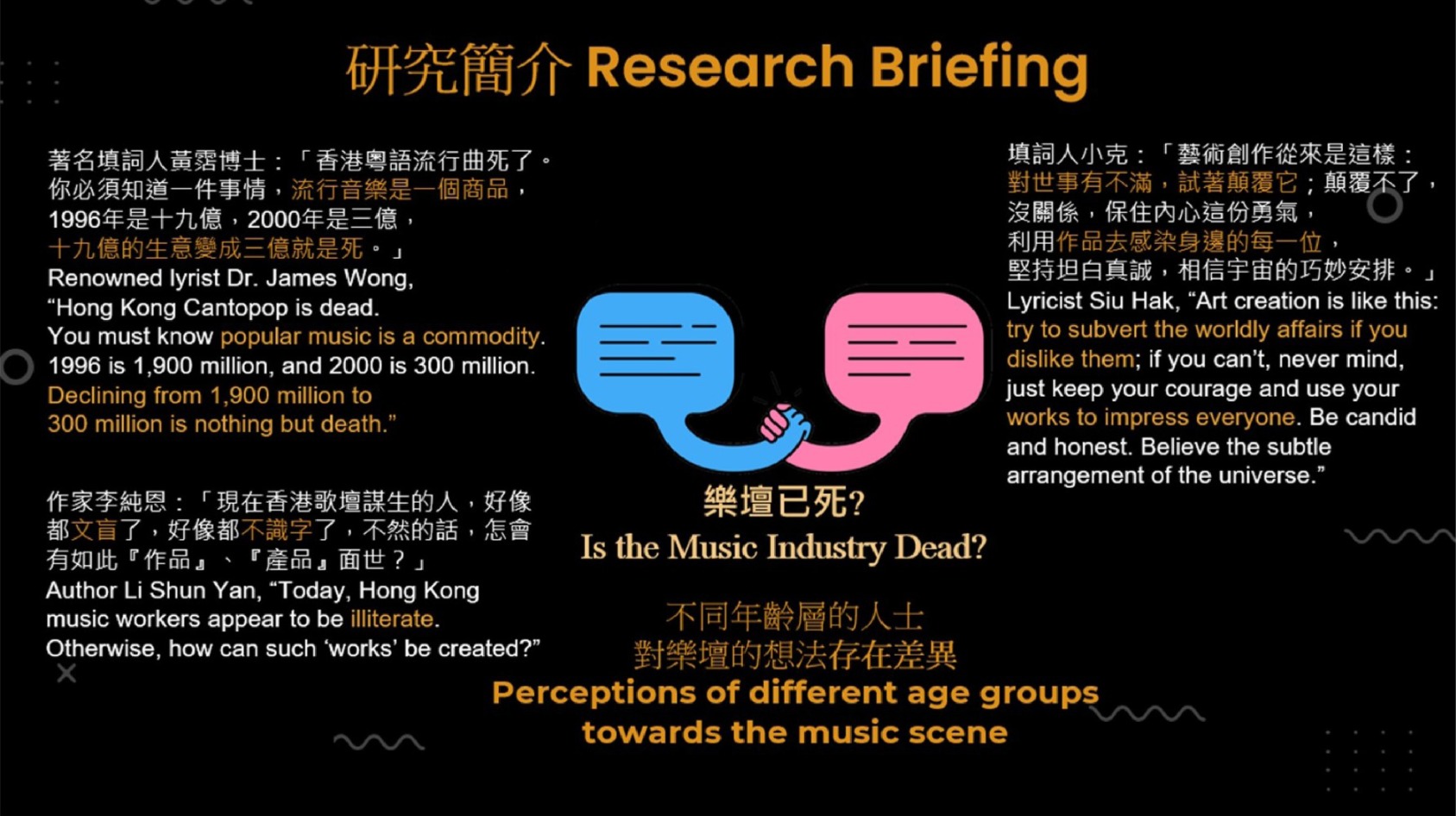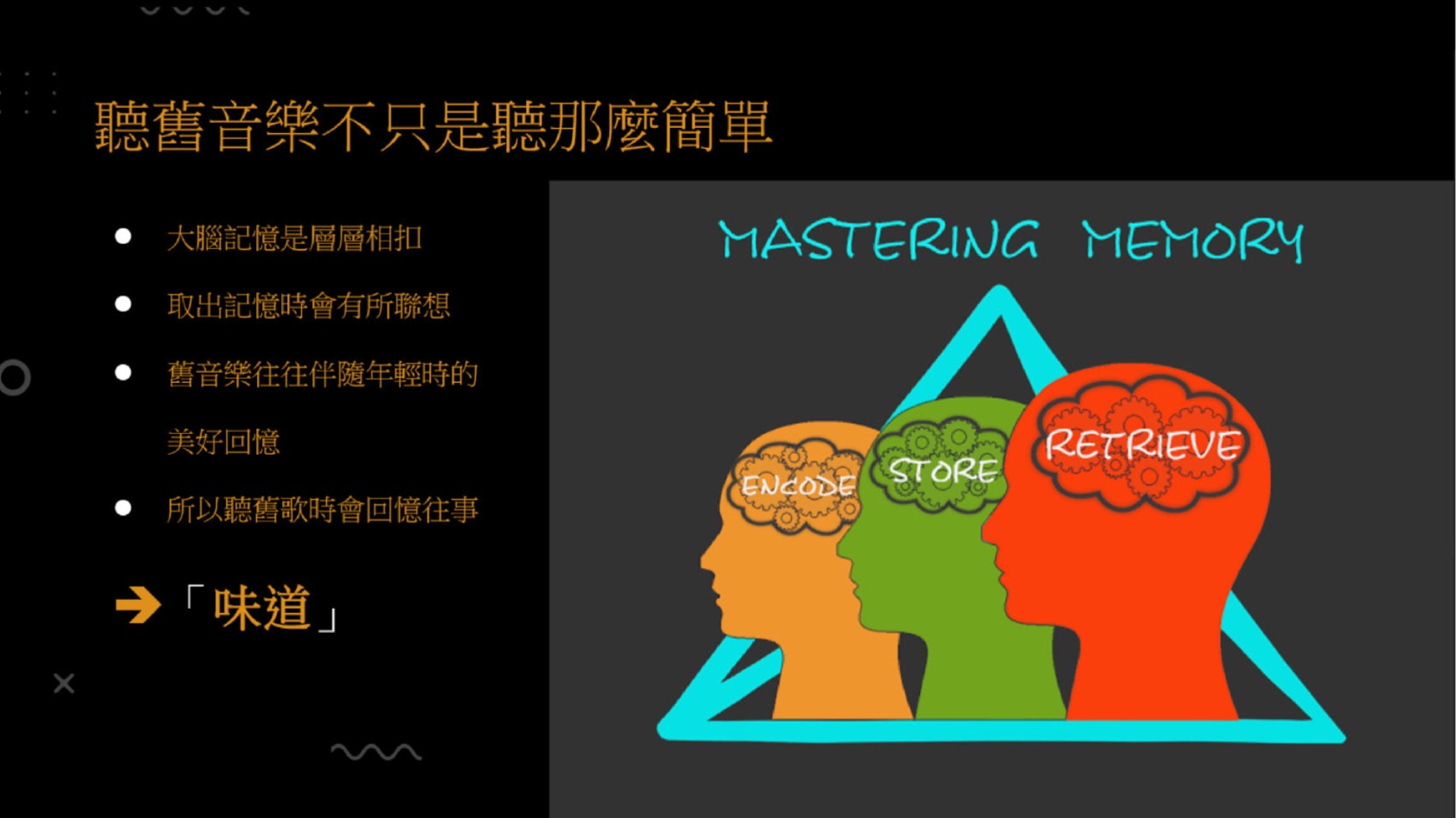


With a half-century history, Cantopop has been a typical Hong Kong cultural icon from the 1970s to the 21st century today. Chung Chi alumni Ms. Leung Pui Ching and Ms. Liu Ching Ying, together with Chung Chi students Ms. Cheng Nga Ying and Mr. Siu King San, collaborated on the General Education course “GECC4130 Final Year Project” to study this icon in-depth. Based on the theme, “Is the Music industry Dead? The Studies of Hong Kong Cantopop from 1970 to 2021”, they explored how Hong Kongers of different generations perceive Hong Kong Cantopop. What discoveries were dug out from Hong Kongers’ perceptions towards Cantopop?


In the late 1990s, some people criticised that the “Hong Kong music industry is dead’, whereas some held the opposite viewpoint.
Hong Kong Cantopop emerged in the 1970s and was in its heyday in the 1980s. A wealth of internationally acclaimed Cantopop hits were released. The late 1990s saw the gradual decline of Cantopop. At that time, some people criticised that the Hong Kong music industry is dead, whereas some held an opposite viewpoint. Those agreed the ”music industry being dead” perceive popular music, a profit-making medium of music productions from the commercial perspective, has been declining in Hong Kong. On the other hand, those against it held that music interconnects with cultural communications and disseminations. We want to explore how Hong Kongers of different ages perceive this local iconic culture through this project.
This research project focused on the Hong Kong Cantopop from 1970 to 2021, taking 1997 as the dividing line. Through online surveys, we explored the perceptions of Hong Kong people aged 12 to 90 towards Hong Kong Cantopop. We listed specific elements, covering the originality of pop music, diversity of lyrics themes, diversity of music genres, charisma and achievement of singers, popularity of songs, issues of resources and media carriers, and fans, as the judging criteria, attempting to dig out the different perceptions towards Cantopop from people of different backgrounds, including ages, genders, household incomes, music preferences, and education level, among others.


The research team discovered that listening to oldies is associated with the sweet memories of old days.
The research findings reflect there are obvious discrepancies in the perceptions towards Hong Kong Cantopop among local people of different age groups. People aged 50 or above generally agreed that the Hong Kong “music industry is dead”, whereas younger respondents held the opposite viewpoint. In view of this, our research aspired to explore the rationales which support their perceptions based on relevant criteria. For example, regarding the “originality of pop music”, most Hong Kong Cantopop songs in earlier days adapted from Japanese music were localised with Cantonese lyrics, such as Hacken Lee’s Red Sun. Therefore, the originality of pop music in Hong Kong was relatively low. Until the late 1980s, a radio broadcaster initiated a campaign advocating the originality of pop music, since then more original works have been created. Nowadays, the music industry in Hong Kong flourishes prosperously. Many singer-songwriters compose, write, sing, arrange, and produce their music works themselves.
Concerning the “popularity of songs”, mass entertainment channels were relatively fewer before 1997. Thanks to the widespread of television, TV dramas have become a popular icon. Many classic TV drama theme songs, such as The Bund, were household names. Since 1997, a plethora of mass entertainment options have been available. In the wake of the decreasing influence of traditional media and the increasing popularity of the Internet, the audience has more choices. Cantopop hits are usually circulated among younger generations. When asked about the “popularity of songs” in Hong Kong, the older respondents think that the popularity of Cantopop was higher before 1997, whereas the younger ones think it has been higher since 1997, reflecting that the two entirely different viewpoints of different generations. As for the “diversity of lyrics themes”, love song was always the mainstream genre from the heyday of Cantopop in the 1980s to the early 2000s. Renowned lyricist Mr. Jimmy Lo initiated the “Non-Love Songs Campaign” in 1983, aiming to confront the music industry dominated by love songs. On top of it, more songs about social and livelihood issues arose after 1997. We notice that mainstream songs have no longer been confined to love songs since the 2000s.
All in all, the factors influencing Hong Kong people’s perceptions towards Cantopop are by no means exhaustive in this study. As a research team, we all believe that the pop music industry can grasp the audience’s taste and create more Hong Kong pop songs easier as long as Hong Kongers still care about the local music industry.